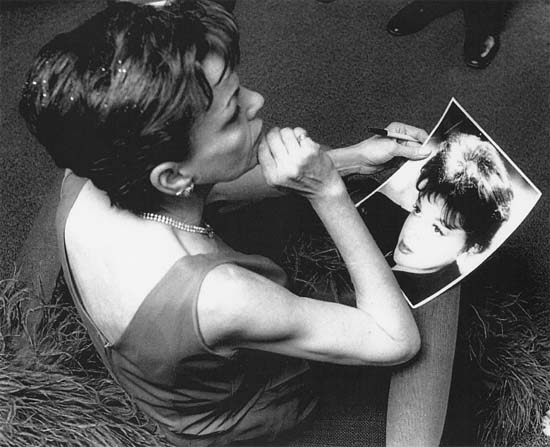Judy Garland on Judy Garland (36 page)
Read Judy Garland on Judy Garland Online
Authors: Randy L. Schmidt

With Jack Paar, 1962 I
NTERNATIONAL JUDY GARLAND CLUB

With Liza, Joe, and Lorna on her 1963 Christmas show, episode No. 15 of
The Judy Garland Show

With Gypsy Rose Lee on San Francisco television, August 1965 I
NTERNATIONAL JUDY GARLAND CLUB

With Mickey Deans, December 1968

At the
Valley of the Dolls
press conference, 1967 I
NTERNATIONAL JUDY GARLAND CLUB

With children Lorna and Joe at Disneyland G
LOBE PHOTOS

Backstage at Copenhagen's Falkoner Centret, March 25, 1969 I
NTERNATIONAL JUDY GARLAND CLUB

Judy Garland, New York, January 7, 1963 P
HOTOGRAPH BY RICHARD AVEDON © THE RICHARD AVEDON FOUNDATION
NOT
TO LOVE A WOMAN
JUDY GARLAND |
February 1955,
Coronet
It has been well documented that Judy's personal life was full of highs and lows. She relied heavily on the strength and stability she found in Sid, but the Lufts' relationship was rocky, to put it mildly. Their marriage flourished and then faltered to the point that Judy filed for divorce on several occasions during the latter part of the 1950s, but each time the couple quickly reconciled. Whether qualified to offer relationship advice or not, Judy provided fascinating insight into her marriage when she addressed the audiences of both
Coronet
and
Reader's Digest
(May 1955) in this essay on the art of being a subservient wife.
A great actress tells frankly the single thing a man must know to make a woman happy
Millions of words have been written on how a man should love a woman. But I have been looking in the mirror and thinking backwards. And I would like to give you my reflections on the things a man should
not
do in loving a woman. Perhaps I am wrong. You will know.
Don't yield your leadership. Don't hand us the reins. That's the main thing. We would consider this an abdication on your part and quicker than anything else, it will fog the clear vision of mutuality which made us love you in the first place.
It would confuse us, it would alarm us, it would make us pull back.
Oh, we will
try
to get you to give up your position as Number One in the house. That is the terrible contradiction in us. And you must realize
that we can't help it. It will be a mistake on your part if you blame this contradiction on us and get furious at its very existence. You will have to understand that it
does
exist, because you're the one who's going to get us over it, if anybody ever is.
We will seem to be fighting you to the last ditch for final authority on everything for a while. But in the obscure recesses of our hearts, we want you to win. You
have
to win. For we aren't really made for leadership. It's a pose.
If you can't teach us that, I think it would be better for you to leave. I really do. It means we really can't be women at all. Or at least we don't intend to be women for you.
And some woman
will
mean to be for you. There have always been plenty of fish in the sea and there always will be. Just don't stay around and be licked; that's no way to love a woman. And that's no woman for you to love.
I think this first bid to get you down, to domesticate you, to make you give up your leadership, is a test we simply must put you through. For, at heart, we are dreadfully insecure. And we must know, beyond doubt, that we're safe with you. That you can take it, that you are not bluffing about your strength. And most of all, that you
care
enough to win.
Yes, that's it.
That you care enough to win.
It isn't that we're testing you just because we're biologically vulnerableâare going to bear the children. That's not it at all. We're brave as lions (no matter how much we snivel at our “fates”) when it comes to our biological destinies. Or your economic ups and downs. Or earthquakes or floods or anything real and tangible like that.
What we're really scared of is that your love will go dead on us; that you will leave us. And, being women, being the natural born “passive” ones, that we won't be able to lift a finger to stop it, that being the “followers” means ceding our rights to fight for what we want to keep. To fight for
you.
And that's why we fight
with
you, why we struggle; until we're totally reassured that it's all right to stop trying to tame you, to beat you to a pulp, to a nonresister who will never leave us. And whom, at that point, we wouldn't love anyhow.
You may say you don't like it that way. You like a woman who knows her own mind. Whom you can depend on. Who's clear, definite and so
forth. You don't want a child bride with a flower-mind cluttering up the landscape.
Well, that's all right, too. We will be what you want us to be. We will be Miss British Tweedy with horsewoman's stride and a stentorian voice. Or we will be Miss Sunshine Efficiency of 1955 with a house in apple-pie order, the children as quiet as mice and your slippers waiting. Or we will be Miss Roundeyes Switch-hips with a champagne giggle and a come-hither leer twenty-four hours a day.
We will be anything you want.
That's the point. As long as you want it, and make it clear that you do.
And you? What do you have to do to get this paragon of giving womanhood? Well, don't worry about the details if you really love to have us around. It'll show. We'll know. It doesn't matter if you don't help with the dishes if you think it's demeaning. It probably is, if you think so. And it doesn't matter if you're terrible at odd jobs around the house, rebel at our long phone conversations with girlfriends, get furious at our pampering of the children, bring us to heel about money. Oh, if you only knew how much it didn't matter.
If
we know, know,
know
that you're Number One and love the role.
Oh, maybe some
little
things matter. How and how often you get it over to us, spontaneously and in your own way, that the intense secret of our love is on your mind, causing you to think about it. But never mechanically. The mechanization of love we dread more than anything. It means death to us.
I know a husband who sent two dozen roses a day to his wife. Every day, every day in the year. In the end the routine arrival of the flowers, such a lovely gesture at the beginning, became a horror to her. Her “thank you darlings” became phrases to choke on, her pleased smile curdled on her lips.
“What did I do?” he asked bewilderedly when she sued for separation. Well, he hadn't done anything terrible. But yet he had.
Gift-giving, we know intuitively, is one of the chief ways you have of telling us about your feelings for us. It is only meaningful to the woman if she recognizes that subtle essence of wanting-to show-your-feelings in the giving. The gift? Our hero would have done far better to have given one rose a month, interspersed with an occasional set of inexpensive earrings
or box of chocolates than to have indulged his monotonous fantasy to the extent he did.
And, for heaven's sake, don't trust when we tell you what we want directly. We don't
want
a new mop. We don't even want a washing machine. We want something from you that is exclusively for us. A five-dollar bill, even a one. If you say something
right
with it, something you mean: “Run wild with this, darling” or “But yourself five ice cream sodas.”
